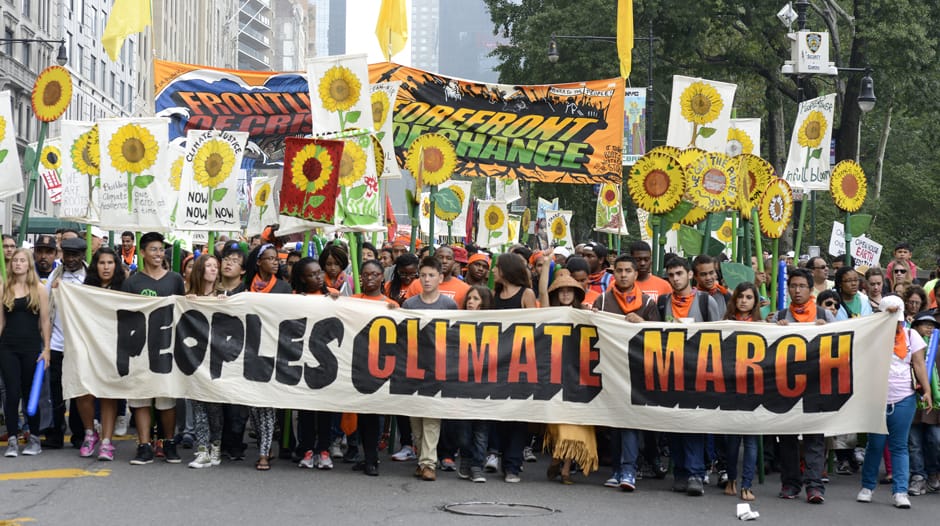Issues of First Nations sovereignty and self-determination are continually being papered on the halls of Canadian consciousness. The more our artists, activists, journalists, scholars, students, and First Nations’ communities work to pull back the veil on our country’s colonial legacy, the more nuanced that legacy appears. In fact, the further back the veil slides, the more our nation’s pedigree seems bound up with what the scientific, and some religious, communities tell us is the most pressing issue of our time: climate change.
For many of us, climate change is our gravest concern. To quote UN Secretary General Ban Ki-moon, climate change is “the defining challenge of our era.” But when you look past the carefully chosen quotations, the sound bites lifted by the mainstream media, and the distortions that big green groups serve up to the public — if you direct your attention to the front lines of the climate movement — you will see that activists are really rallying about inequality.
Even as we call attention to global warming, the millions displaced by extreme weather, or the risk of retaining walls rupturing and the tailing ponds of the Alberta tar sands spilling into the Athabasca, the front lines are talking about inequality between people, governments, and nations.
As journalist and activist Naomi Klein said in a recent interview, “We can’t fight climate change without dealing with inequality within our countries and between our countries.” This suggests that we don’t need a radical reordering of our political, economic, and social systems to have a fairer society; we need a radical reordering to have a livable society.
PROBLEMS
We all know the science. We’re pretty sure that 98 per cent of the scientific community is correct when they proclaim, from every mountaintop they can climb, that the problem of climate change is largely the product of humanity.
While Torontonians might feel like summer temperatures passed them over this year, NASA has confirmed that last August was the warmest on record. What’s more, as the science linking extreme weather to climate change piles up, it is no longer difficult to see how the havoc wreaked by a warming planet is rooted in the actions of just one of its species.
Some things haven’t changed. Some things stay the same, even if on the surface they appear different or seem better. When Angélica Navarro, a Bolivian climate negotiator talks about global warming, she correctly declares herself and all the inhabitants of the global south as “climate creditors.”
In her speech at the United Nations climate conference in Bonn, Germany in 2009, she explained that “[m]illions of people, in small islands, least developed countries, landlocked countries as well as vulnerable communities in Brazil, India and China, and all around the world — are suffering from the effects of a problem to which they did not contribute.” It is here that we can see, as Klein points out, the “intimate connection between climate change and colonialism.”
Just as the arbiters of the colonial project exploited the Amerindigenous throughout the Americas, so too does the extractivist ideology of our fossil fuel economy exploit the environment of the indigenous world. Bolivia is extremely reliant on glaciers for drinking water and irrigation, so when the snow-capped peaks of the Andes are reduced to muddy mountaintops, the very livelihood of a nation that has been suffering the effects of colonialism for hundreds of years is affected by a modified yet no less extreme form of exploitation.
All of this says nothing about the local destruction wrought by the Canadian oil and gas sector, that flailing cephalopod of pipelines that seeks to stretch its tentacles across the treaty-protected lands of the First Nations.
INROADS TO CHANGE
In 1990, governments began officially negotiating how best to solve the climate crisis. Since that time, emissions have gone up by 61 per cent. That being the case, it shouldn’t surprise us that almost a half million people took to the streets of New York City last month, making the People’s Climate March the largest climate gathering in history.
It shouldn’t surprise us that indigenous activist groups represented the vanguard of the march and that gatherings in solidarity were held in 162 different countries. Mass sit-ins like #floodwallstreet, which halted business in the New York Stock Exchange and resulted in a hundred arrests, are putting real pressure on the ineffectual government, corporate, and market driven responses to the climate crisis.
On school campuses around the world, including ours, divestment campaigns have started to spring up, calling on our institutions to pull their money out of fossil fuels. This year’s DisOrientation Week provided the “Defiant Spaces” we need if we are to foster the requisite elements of resistance and effectually set them in place.
Navarro, Klein, and all of us who see the post–carbon economy as part of a beautiful, necessary, and decolonized world do not suffer from utopian far-sightedness; we have simply removed the rosy frames from our eyes and have recognized the need — the “opportunity,” as Navarro puts it — to be a part of “a massive mobilization larger than any in history.”
Sean Allingham is a third-year student studying English, philosophy, and literature and critical theory.


